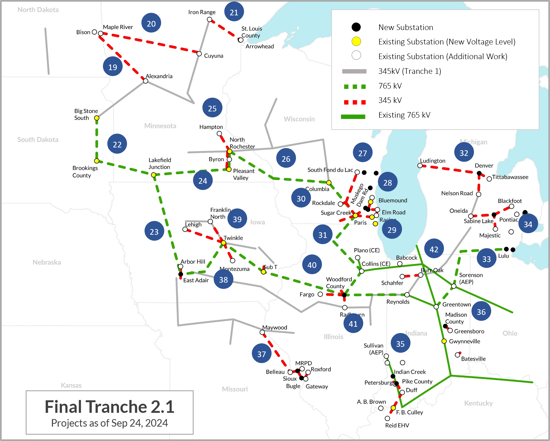The Midcontinent Independent System Operator (MISO), which manages the grid in most of Michigan and much of the central United States, has launched one of the most ambitious transmission expansion efforts in decades. Its Long-Range Transmission Plan (LRTP) calls for thousands of miles of new high-voltage lines, an effort which promises to deliver billions in net benefits to ratepayers by unlocking cheaper renewable power, reducing line congestion, and improving reliability. For more background, see two previous op-eds from CUB: one in the Detroit News by CUB co-founder John Liskey and one in the Detroit Free Press by CUB Executive Director Amy Bandyk and Natalie Lyijynen of the Michigan Energy Innovation Business Council.
These transmission lines will be built in a phased approach which includes four tranches. Approved in 2022, Tranche 1 included two major projects in Michigan — one linking the Indiana border to Calhoun County and another connecting Eaton County to Gratiot County. A recent CUB blog post describes the details on the estimated net benefits between $2.2 billion and $3.4 billion that MISO has estimated these lines will create for MISO Zone 7, the zone that includes most of the Lower Peninsula of Michigan
In late 2024, MISO approved Tranche 2.1. The $21.8 billion portfolio includes 24 high-voltage transmission projects totaling roughly 3,631 miles across nine states in the MISO Midwest region. In total, the projects promise to provide up to $83 billion in net benefits, while the benefit/cost ratio is up to 2.2 for Zone 7. That means every dollar spent in the Lower Peninsula could return up to $2.20 in benefits. Michigan will host several major Tranche 2.1 projects, including several 345 kV lines in the state’s center, and one 765 kV line in the south near the Indiana–Ohio border.
However, on July 30, 2025, a coalition of state utility commissions—Arkansas, Louisiana, Mississippi, North Dakota, and Montana—filed a complaint with FERC, challenging the approval of LRTP Tranche 2.1. They argue that it relies on a benefits framework that overstates project value, and likely underestimates costs.
CUB believes that this challenge is misguided on multiple fronts. Extensive analysis conducted by MISO shows that benefits of the projects included in the tranche comfortably exceed costs in every zone in the MISO Midwest region, including Zone 7. A strange aspect of this complaint most of the states bringing the complaint (including Louisiana, Mississippi, Montana and Arkansas) aren’t part of the Midwest region, meaning that they wouldn’t be liable for the costs.
Tranche 2.1 presents a rare opportunity to benefit Michigan ratepayers. Transmission lines may not grab headlines like wind turbines or solar farms, but they are one of the most cost-effective ways to address the rising demand for electricity and make electricity bills more affordable. CUB is in favor of MISO moving forward with Tranche 2.1.

